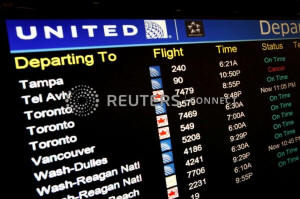|
U.S. judge rules against Expedia in
United Airlines fare listings lawsuit
 Send a link to a friend
Send a link to a friend
[April 06, 2019]
By Jonathan Stempel
 NEW YORK (Reuters) - A federal judge in
Manhattan on Friday rejected Expedia Inc's request for an injunction
that would have required United Airlines to continue providing fare data
for flights after Sept. 30, when the companies' contract ends. NEW YORK (Reuters) - A federal judge in
Manhattan on Friday rejected Expedia Inc's request for an injunction
that would have required United Airlines to continue providing fare data
for flights after Sept. 30, when the companies' contract ends.
U.S. District Judge Kevin Castel said Expedia had shown a "likelihood of
success" on the merits of its breach of contract claim, but did not show
a preliminary injunction was needed to avoid irreparable harm or serve
the public interest.
An injunction would have required United, part of Chicago-based United
Continental Holdings Inc, to provide Expedia with fare and schedule
information for all its publicly available flights, including those
after Sept. 30.
"We welcome the ruling from the judge in favor of United which will
minimize the risk of disrupting our customers’ travel plans and ensure
we can effectively serve customers who need to make changes to their
itineraries purchased through Expedia," United said in an emailed
statement.
Expedia did not immediately respond to requests for comment.

The dispute came as some carriers try to reduce distribution costs by
encouraging travelers to book directly rather than through online travel
agencies such as Bellevue, Washington-based Expedia.
Southwest Airlines Co has long relied on direct bookings, and JetBlue
Airways Corp in October 2017 pulled its fares from several online
agencies.
Expedia accused United of trying to force a renegotiation of their 2011
contract by threatening to withhold fares for flights after Sept. 30,
leaving it unable to book or change tickets.
United countered that limiting fare listings would benefit travelers
flying later, because the companies' "coming divorce" would leave
Expedia unable to serve them.
[to top of second column]
|

A United Airlines electronic departure board is pictured inside the
terminal at Newark International Airport in New Jersey, July 22,
2014. REUTERS/Eduardo Munoz/File Photo

In his decision, Castel found no language in the contract between
Expedia and United suggesting that United would withhold fare
information in the final months, and no evidence that Expedia would
be unable to service customers through Sept. 30.
But he also found no proof that maintaining the "contractual status
quo" would irreparably harm Expedia, even if the dispute led to
customer confusion and hurt its reputation.
Castel also said the public interest did not weigh in favor of a
preliminary injunction.
"There is no serious issue as to the ability of members of the
public to fly on their airline of their choosing," he wrote.
"Meaningful and prominent disclosure will mitigate any harm to the
public."
The case is Expedia Inc v United Airlines Inc, U.S. District Court,
Southern District of New York, No. 19-01066.
(Reporting by Jonathan Stempel in New York; Editing by Richard Chang
and Tom Brown)
[© 2019 Thomson Reuters. All rights
reserved.]
Copyright 2019 Reuters. All rights reserved. This material may not be published,
broadcast, rewritten or redistributed.
Thompson Reuters is solely responsible for this content.
 |